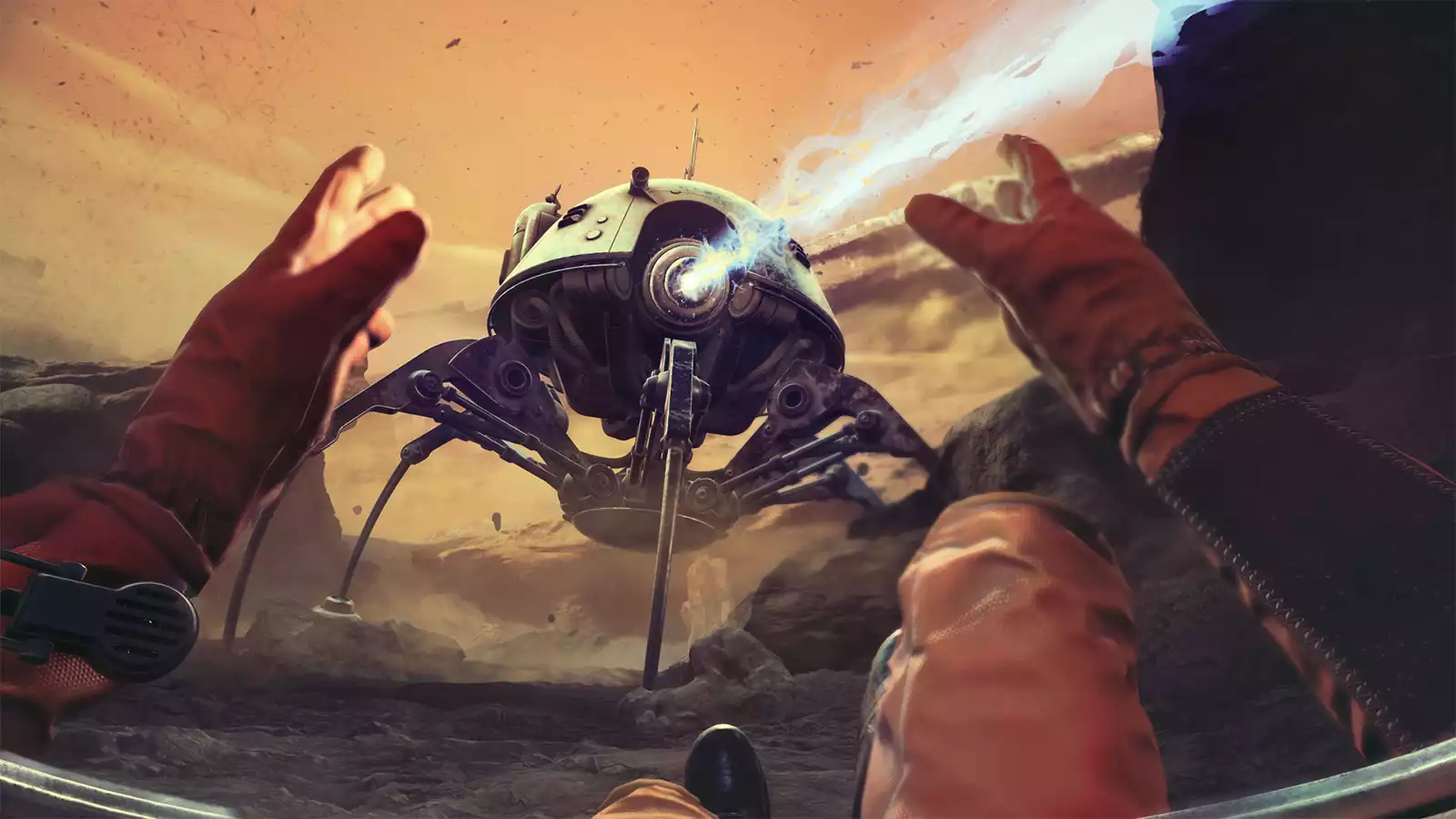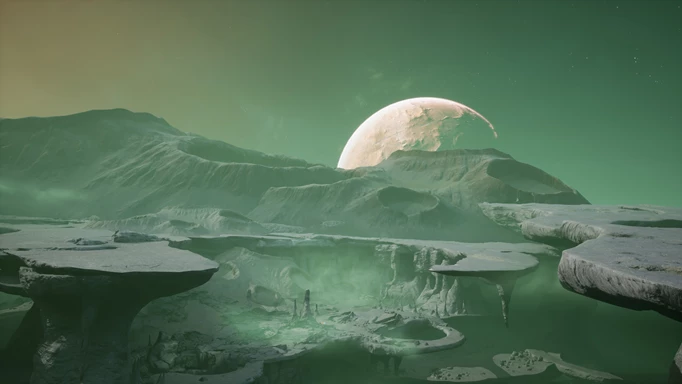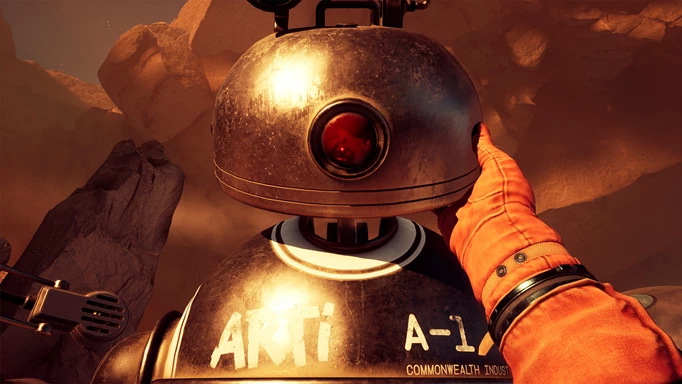The Invincible review: Sci-fi godfather Lem's adventure is atmospheric & existential

Games based on novels are unfortunately pretty sparse, and that’s a big shame, especially when considering the soaring heights that the page has made in the interactive space.
The biggest example of the slim phenomenon is perhaps The Witcher, the fantasy RPG series that grew from Andrzej Sapkowski’s grandiose novels - but it doesn’t seem that novels have made much of a splash beyond that.
It’s a shame, what with the sheer sum of gamers who wouldn’t think to pick up a novel and find their next favourite story - and in some cases, the interactive medium is the best place to bring to life a narrative that needs to be brought to public attention.
This once seemed like the opposite of the attitude held by the estate of iconic Polish writer Stanislaw Lem, a writer famed for his prophetic sci-fi that, armed with his most popular story Solaris, rocketed to the hall of legends to stand beside genre giants like H. G. Wells and Isaac Asimov. Solaris might have been a big deal, but he has deeper cuts that deserve more than they get - which might be why the Lem Estate was so interested to hear Starward Industries out.
The Invincible is the company’s boldest step yet, taking the short novel of the same name into the world of video games to an audience that, in many cases, might not know its source material. That certainly doesn’t make it any less compelling, welcoming players to the eerily empty Regis III with a retro-futuristic aesthetic that defies current sci-fi trends.
There’s a lot riding on The Invincible, not only for Starward, but for novel adaptations as a whole - and though The Invincible has the nerve to stray from its source material in some respects, it delivers a reflection of the story that Lem could be proud of.
GGRecon Verdict
The Invincible might have its minor problems, but they don’t do much to draw from the fact that Starward Industries has proven that the direct adaptation of The Invincible was always destined to be a video game.
The quiet combo of solace and unease that Yasna finds on Regis III is spellbinding, and the chance for multiple endings helps to enhance Lem’s intentions with his work rather than squander them.
Back to the (Retro-)Future

 Click to enlarge
Click to enlargeTaking a bold step away from the protagonists of the original novel, The Invincible follows Yasna, an optimistic biologist who wakes up on the planet Regis III, remembering little beyond the fact that she shouldn’t be there.
As she searches for the rest of the crew of The Dragonfly, and the legions aboard the mysteriously quiet ship The Invincible, she discovers far more than she bargained for, sending her into a spiral that threatens her worldview and understanding of humanity in the universe.
The Invincible has a lot of big questions to ask, and it gives the player plenty of time and space to consider them. The game is a true slow-burner, making your exploration deeply considered, and gives great weight to even the most minor decisions you make.
Though some moments of travelling between points of interest begin to dissolve into monotony, for the most part, Regis III is a joy to explore and try to make sense of - and the mysteries that unfold with each new discovery are palpably fascinating.
The Invincible takes brave strides from the novel which will either ring immensely true or instil a scepticism in the player. If you’re a fan of the book, the change in perspective may be of concern, and the chance to change the course of the story and even find fresh endings will either impress or frustrate you.
To the newcomer, the changes that have been made to the progress of the story make perfect sense, and the story’s lucidity helps to accentuate the game’s final moments' importance to the original novel. The final decisions you’ll make here are hugely reminiscent of the messages told in sci-fi from Lem’s era, and no matter what comes before it, its possibilities are reflective of the author’s hopes for the story.
Enter the Necrodome

 Click to enlarge
Click to enlargeThe gameplay of The Invincible gels with its story well, even if a few bugs and concerns pose a threat to both. You’re offered no help in terms of controls, which help to accentuate your helplessness on the dangerous planet, and making sense of the game’s mapping systems and various retro-futuristic tech becomes a satisfying exercise in self-management.
It’s this individuality and implied freedom that is met with contention, though - invisible walls have a tendency to box the player in if they find them, and lighting glitches and rocks becoming trapped underneath the player’s rover vehicle can make getting from point A to point B a loud, chaotic experience.
These issues can dissect immersion from moment to moment, but the fascinating revelations that peek through the narrative of The Invincible do well to pull you straight back into the fray, making new discoveries and finally making sense of the horrifying events that unfolded before you arrived on the planet prove that the direct-to-video-game adaptation of Lem’s story was incredibly well justified.
The story’s twists and folds keep you pinned into the experience providing that you can work with an experience that truly takes its time, reflecting the “Firewatch/Alien: Isolation kind of vibe” that the team’s CMO told GGRecon about in our recent conversation.
Perhaps a faster player character would have made the experience more accessible and immediately compelling, but the game’s approach to isolation makes The Invincible all the more memorable.
The Verdict

 Click to enlarge
Click to enlargeThe Invincible might have its minor problems, but they don’t do much to draw from the fact that Starward Industries has proven that the direct adaptation of The Invincible was always destined to be a video game.
The quiet combo of solace and unease that Yasna finds on Regis III is spellbinding, and the chance for multiple endings helps to enhance Lem’s intentions with his work rather than squander them.
An atmospheric adventure that draws its players into trance-like exploration, The Invincible has made a case for retro-futurism’s comeback, and as far as sci-fi narratives go, you won’t find a more compelling world than Regis III this year.
Perfect? No - but more than enough to prove the talents of Starward Industries, and bring Stanislaw Lem to new audiences that will feel the full force of his invasively existential storytelling prowess. We can’t promise that your stay on Regis III will show you the lap of luxury, but the furious cocktail of wonderment and ego death will make you feel. The Invincible is the eerie getaway you’ve been looking for, even if your home flight might be… delayed.
3.5/5
Reviewed on PlayStation 5. Code provided by publisher.
For more recent reviews, be sure to check out what we thought of Jusant, Insomnaic's spider-sequel, Spider-Man 2, or Alan Wake 2.
